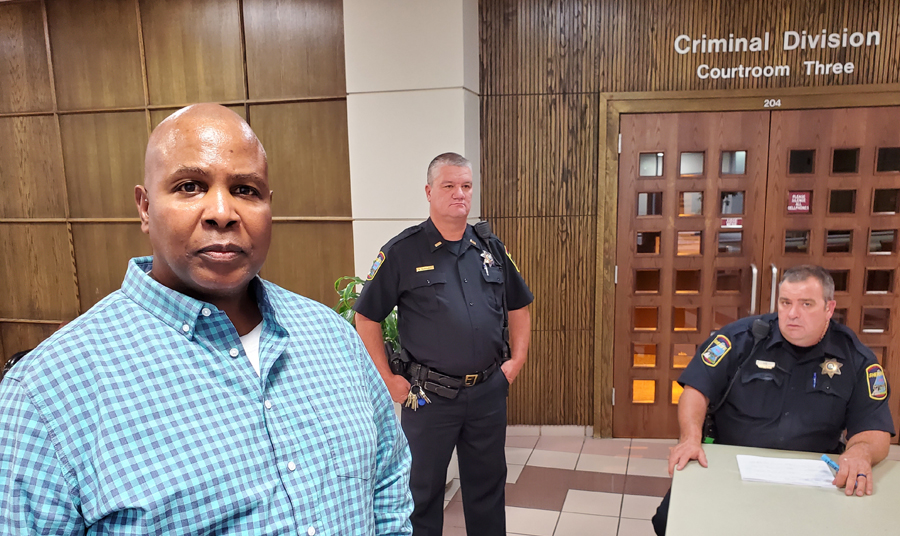
Shameca Burt in 2018 fights in federal court for her children. Today she is victim of a crooked arrest warrant procedure that violates state law. My letter to Lorrie Miller, chief magistrate of Hamilton County, declares what the law requires in the creation of an arrest warrant. Local policy forbids complainant of a crime to come to the jail to draft and swear out the arrest warrant. A shortcut puts cops, deputies in the role of affiant, though at best they offer hearsay. (Tulis Report)

Michael James is maliciously prosecuted under a crooked system that refuses to require two teen girls who lied about him to swear out their complaint under oath before a county magistrate. (Photo David Tulis)

Lorrie Miller, magistrate
[Investigative reporter’s demand letter to Lorrie Miller, chief magistrate, Hamilton County, Tenn.]
Your practice of denying members of the public the right to be complainants alleging crime before a magistrate is improper and outside the law. In a phone call Dec. 18 you ask me to send you an email detailing my concerns about arrest warrant creation shortcuts.
By David Tulis / NoogaRadio Network
Arrest warrants under your custom and usage are not sworn by a complainant. They are sworn by police officers and deputies who make appearance before you or another magistrate, draft a complaint of arrest, swear to it and obtain your signature.
This shortcut is companion to Hamilton County’s general warrants practice, a separate breach outlawed by Tenn. const. Art. 1, sect. 7 that “the people shall be secure in their persons *** from unreasonable searches and seizures, and that general warrants *** are dangerous to liberty and ought not to be granted,”and sect. 8 that “no man shall be taken or imprisoned, or disseized of his freehold, liberties or privileges, or outlawed, or exiled, or in any manner destroyed or deprived of his life, liberty or property, but by the judgment of his peers, or the law of the land,” and the U.S. constitution bill of rights, the 4th amendment, “The right of the people to be secure in their persons, houses, papers, and effects, against unreasonable searches and seizures, shall not be violated, and no Warrants shall issue, but upon probable cause, supported by Oath or affirmation, and particularly describing the place to be searched, and the persons or things to be seized.”
The Tennessee warrants law requires that the complainant make appearance before you, swear under oath to God or under personal affirmation that he tells the truth, puts the charge in writing, then swears out the arrestable crime.
A warrant of arrest is an order, in writing, stating the substance of the complaint, directed to a proper officer, signed by a magistrate, and commanding the arrest of the defendant.
Tenn. Code Ann. § 40-6-201
The warrant is to be based upon sworn statements reduced to writing by an accuser based on first-hand knowledge. The officer is part of this sequence. He enters the scene because the warrant is “directed to” that “proper officer” commanding him to “arrest *** the defendant.” The magistrate puts into the officer’s hand the sworn accusation of the fact witness, victim or accuser. The officer serves the interest of justice by departing the magistrate’s office to make the arrest.
The necessity for victim and witness swearing is vital for the protection of the innocent, and to not remove a burden the law requires be placed upon an accuser or witness. Keeping a victim or fact witness from presenting himself before the magistrate throws sand and grit into the justice expected in commencement of a prosecution.
A prosecution is commenced, within the meaning of this chapter, by finding an indictment or presentment, the issuing of a warrant, the issuing of a juvenile petition alleging a delinquent act, binding over the offender, by the filing of an information as provided for in chapter 3 of this title, or by making an appearance in person or through counsel in general sessions or any municipal court for the purpose of continuing the matter or any other appearance in either court for any purpose involving the offense. A prosecution is also commenced, within the meaning of this chapter, by finding an indictment or presentment or the issuing of a warrant identifying the offender by a deoxyribonucleic acid (DNA) profile.
- 40-2-104. Prosecution; commencement
The issuing of a warrant requires a fact base just as the obtaining of an indictment. A witness makes appearance before the grand jury if he has first-hand knowledge of a crime having been committed. The process, outlined at 40-12-104. Application to testify by person having knowledge of commission of offense.
(a) Any person having knowledge or proof of the commission of a public offense triable or indictable in the county may testify before the grand jury.
(b) The person having knowledge or proof shall appear before the foreman. The person may also submit the sworn affidavits of others whose testimony the person wishes to have considered.
(c) The person shall designate two (2) grand jurors who shall, with the foreman, comprise a panel to determine whether the knowledge warrants investigation by the grand jury. The panel may consult the district attorney general or the court for guidance in making its determination. The majority decision of the panel shall be final and shall be promptly communicated to the person along with reasons for the action taken.
(d) Submission of an affidavit which the person knows to be false in any material regard shall be punishable as perjury. An affiant who permits submission of a false affidavit, knowing it to be false in any material regard, is guilty of perjury. Any person subsequently testifying before the grand jury as to any material fact known by the person to be false is guilty of perjury.
40-12-104. Application to testify by person having knowledge of commission of offense (emphasis added)
If an affiant appears before the grand jury with less than first-hand testimony, his presentation either to the select committee or the whole body might be enough for the grand jury to exercise its investigatory powers independent of any testimony by officer or citizen at § 40-12-201. Use of investigative grand jury. Fact testimony before the grand jury is sworn and any claim “false in any material regard shall be punishable as perjury.”
The grand jury in this instance relies on first-hand testimony under penalty of perjury.
Officers comprise the bulk of testimony before the grand jury. They are forbidden to testify apart from investigations making them, effectively, firsthand witnesses that a crime has been committed by a person, and that there is probable cause to believe that the party identified committed the crime, sufficient for a trial on the facts by the petit jury.
Perjury is forbidden in Tennessee. The necessity to bring a complainant before a magistrate when a crime is in process of being created is clear in the prohibition itself of false witnessing and talebearing in an official matter.
A person commits aggravated felony perjury “who, with intent to deceive: (1) Commits perjury as defined in § 39-16-702; (2) The false statement is made during or in connection with an official proceeding; and (3) The false statement is material” T.C.A. § 39-16-703. Aggravated perjury.
In 702, perjury is defined as an act “with intent to deceive” by a person who “(1) Makes a false statement, under oath; (2) Makes a statement, under oath, that confirms the truth of a false statement previously made and the statement is required or authorized by law to be made under oath” or makes a false statement, not under oath, on an official document or a false statement made under a jurat “under penalty of perjury.” Perjury in 102 is a misdemeanor.
The definitions of perjury have bearing on the matter of complainant swearing vs. officer swearing before a magistrate to create a criminal offense for which arrest warrant issues
A swearing before a magistrate at the jail, in demanding an arrest warrant for a crime having been committed, is a high crime if false.
It being a felony puts the affiant on awares as to the penalty for false accusation. Felony perjury is sentenced to a year or more in prison. Swearing secures great certitude as to accuracy and authenticity in the allegation. Not only might such a false accuser be guilty of a crime if he lies, but also a tort of slander, civilly actionable, especially if there is no mistake involved in the claim about a crime, but malice, vengeance or evil intent operative.
Courts prefer first-hand testimony
Courts prefer authentic data as the basis of a prosecution. Rule 3. The Affidavit of Complaint requires “an affidavit of complaint” by the victim or first-hand witness.
The affidavit of complaint is a statement alleging that a person has committed an offense. It must:
(a) be in writing;
(b) be made on oath before a magistrate or a neutral and detached court clerk authorized by Rule 4 to make a probable cause determination; and
(c) allege the essential facts constituting the offense charged.
Tenn. R. Crim. P. 3
As might be expected, judges want fact-based testimony swearing, not hearsay and third-party estimations of fact.
The judge was of opinion that the warrant was groundlessly and improvidently issued and refused to allow the justice any costs, and he has appealed to this court. The party giving the information to the justice, knew nothing of the commission of the offense, but had been told by a third party such offense had been committed, and so stated to the justice. Under these circumstances the magistrate ought not to have issued a warrant, as being informed that the informant knew nothing about the matter, he could not have been satisfied that such offense was committed, as he should have been before issuing the warrant: Code, sec, 5022. The warrant was, therefore, issued improvidently and without sufficient legal grounds, and the judgment of the criminal court refusing to tax the costs thereof is affirmed.
State v. Good, 77 Tenn. 240 (1877) (emphasis added)
The legal grounds for the creation of an arrest warrant are a victim, testimony, the writing of the instrument, the taking an oath, the signature of the judge or magistrate, and the document in the officer’s hand.
Swearing = accountability, accuracy
The rules of criminal procedure require firsthand accountability for allegations of a crime. T.C.A. § 40-6-203, informants; examination, states the following:
(a) Upon information made to any magistrate of the commission of a public offense, the magistrate shall examine, on oath, the affiant or affiants, reduce the examination to writing, and cause the examination to be signed by the person making it.
40-6-203. Informants; examination (emphasis added)
The following is in the commentary, highlighting the interaction between affiant complainant and the magistrate. 3.1 Tennessee Rule of Criminal Procedure 3 note says the magistrate is not a mere paper pusher.
It is important that any clerk issuing an arrest warrant know and fully appreciate the legal significance of the fact that it is a judicial function which is being performed. The validity of the warrant depends upon the making of a probable cause determination; a warrant must never be issued as a mere ministerial act done simply upon application.
See also Tenn. Code Ann. § 40-6-205(a); Tenn. Rules Crim.P 3 & 4.
Instances of abuse
- The false imprisonment and false arrest of Michael James, case Nos. 1802593 and 1802594. General sessions judge Gerald Webb dismissed the case based on Mr. James’ brief of the county’s rejection of the sworn first-hand complainant rule. Two teen girls in a stolen auto, meeting Mr. James late at night on a city street, called 911 with accusation that he threatened them by waving a pistol out his car window. They crash their car into a building. Witness Mr. James calls police and waits for officers to arrive. They arrest him and take him to you, Mrs. Miller, the magistrate on duty, and charge him with two counts of felony assault. You release Mr. James on his own recognizance. Neither girl is willing to swear out a statement to create a crime. The officer, Lance Hughes, affects an arrest as a third party having no facts and no corpus delecti. Aggrieved Mr. James, victim of false imprisonment and false arrest, is suing Hughes and the city seeking damages.
- Shameca Burt is in Silverdale detention center over the Christmas and New Year’s holidays on an arrest warrant obtained on behalf of Tractor Supply Signal Mountain. Mrs. Burt, who’s in the pallet recycling and refurbishing business, is accused of theft of five discarded pallets outside the fenced-in goods-for-sale-outdoors area, a stack near the dumpster she takes per an established routine. An employee calls police, who hears a claim of theft. The city police officer — not the employee connected with the victimized business — goes to a magistrate and obtains a warrant by swearing it out, according to my information and belief. The officer is a third-person party, not familiar with the facts, having gotten one side. Mrs. Burt, in court in a traffic infraction, is seized under the warrant and remains jailed without bond. She has a “probation violation” hearing before Judge Boyd Patterson Jan. 3, 1:30 p.m. docket.
- D— R—, a retired hairdresser, 69, asks me to help her draft an affidavit of complaint against her apartment building manager. On March 23, 2022, he rapes her in her bathroom, having gained entry on an inspection of the unit’s drains and forcing her into an act of fellatio in her bathroom. I phone you asking how to proceed. She is directed to bring her 37-point affidavit to a city police officer. I witness this encounter with Mrs. Robertson and a young policewoman whose evaluation of the facts controls. No action is taken.
Argument
Prohibiting the operation of law lowers the quality of criminal cases. Hamilton County’s courts get less reliable charges than if the law were obeyed, and are less able to be free from injustice and wrongdoing. You thwart the duty of the fact witness or victim to swear before God, and under the menace of the felony perjury law, to recount his narrative of being a crime victim.
You prohibit evidence-based warrants, and you institutionalize and require hearsay only-based warrants.
Except for the case of rape, the examples I cite are manifest injuries to state victims, to people whose due process rights are overridden by policy.
In “he said-she said” cases where officers are not witnesses, it is essential that no one be arrested and no one charged until after a sworn complaint is made. In Mr. James’ case, the officer should not have touched him until after getting the warrant by one of the girls sworn. The officer would then have had to track down Mr. James to serve the warrant, perhaps calling him by phone to ask this good citizen to meet him at the jail for service. Without a swearing there is no case whatsoever, as he points out in his filings.
Your protocol, Mrs. Miller, is a short-cut and expediency that perpetuates injustice and harm.
I request from you copies of legal briefs, rulings, analyses or resolutions that authorize what you are doing in office as chief magistrate.

